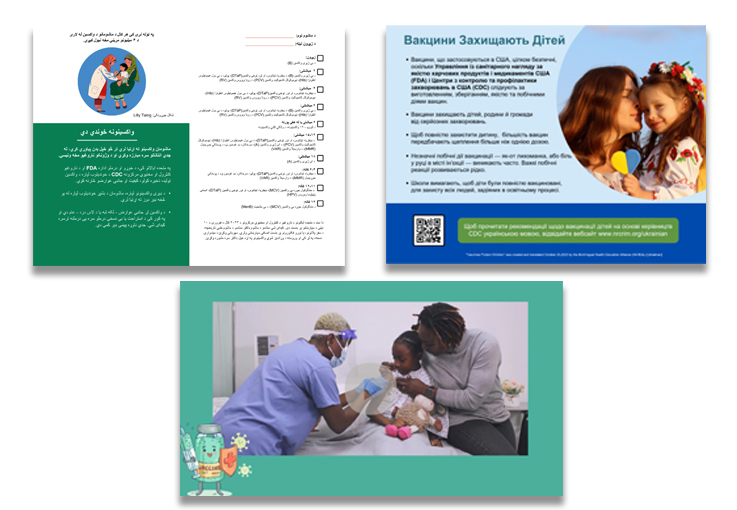The Language and Immunization for Kids Study (LINKS): Identifying Public Health Strategies to Engage Families Who Prefer a Language Other Than English in Childhood Vaccine Uptake
Statement of Problem
As child health researchers and physicians, we know childhood immunization programs and coalitions are among our nation’s most important and effective child health interventions. These programs ensure children receive protection from potentially life-threatening conditions such as measles, polio and hepatitis B. They help children in every U.S. county, parish, borough, state, and territory, even if children are uninsured or families lack the ability to pay.
Ensuring childhood immunization programs remain strong and can continue to reach all children is a child health priority. This includes attention to language access—most often referring to interpreting (spoken, sign language) and translation (written).
Research suggests there may be uneven childhood vaccine coverage for children in some language communities. Similarly, National Immunization Survey data suggests children ages 19-35 months and born outside the U.S. may have lower rates of selected vaccination coverage than other U.S. children.
This may be a sign of gaps in vaccine outreach, education and delivery in languages spoken by families in those communities. And our team’s quality improvement work suggests language access remains a significant barrier to childhood vaccination education and access.
Description
We know solutions exist.
Co-investigator Dr. Elizabeth Dawson-Hahn, a University of Washington pediatrician and public health researcher, and her team identified numerous public health case studies describing strategies for promoting vaccine access among communities who speak languages other than English.
With this project, we aim to systematically describe and share successful strategies that childhood immunization programs and coalitions have used to reach families who speak languages other than English.
To collect this information, we are conducting a national survey of childhood immunization programs and immunization coalitions.
Next Steps
By hearing directly from programs and coalitions, we hope to learn from their on-the-ground experience in our efforts to ensure children whose families speak languages other than English are included in vaccine outreach, education and delivery.
We also hope to document shared challenges that may benefit from policy changes or prioritization from funders focused on promoting child health.
We plan to share results in fall 2025.
This project page was last updated in February 2025.
Related Resources
Multilingual Health Education Alliance (M-HEAL)
The Multilingual Health Education Alliance (M-HEAL)—a partnership with refugee and immigrant health teams at Children’s Hospital of Philadelphia, University of Washington, Denver Health, NRC-RIM and MHEDS—worked with parents, youth, public health professionals, clinicians, and resettlement staff from Congolese (DRC), Ukrainian, and Afghan newcomer communities to create childhood vaccine information in multiple languages.
These posters, videos and brochures share information about vaccine safety and childhood vaccine schedules, including COVID-19 vaccines. They are available in 5 languages: Dari, Pashto, Kiswahili, Kinyarwanda, and Ukrainian. These resources can be viewed and downloaded via Dropbox.
These materials and videos can be used in clinic waiting rooms, doctors’ offices, resettlement agencies, community-based organizations, school clinics, and shared on social media.
Some examples:
The Afghan community created a brochure that talks about vaccine safety and schedules. (top left)
The Ukrainian community created a poster that highlights the safety of vaccines and the protection provided by them. (top right)
The Congolese community created a video that answered frequently asked questions about vaccines. (bottom)

Publicly-available Multilingual Vaccine Education Resources Recommended by LINKS Participants
Translated Vaccine Information Statements | Immunize.org
Translations created by state DOH
- Vacúnalos Por Su Bien | Colorado Department of Health
- What are the vaccine requirements for individuals who move to CT as refugees or humanitarian parolees? | Connecticut Department of Health
- Measles Facts | Minnesota Department of Health
- Vaccines for Infants, Children, and Adolescents | Minnesota Department of Health
- School and Child Care Immunizations Information for Families | Washington State Department of Health
- Fact Sheets | Wisconsin Department of Health
- (search for others or click the vaccine-specific links at https://www.dhs.wisconsin.gov/immunization/vpd.htm)
- Vaccine Information Videos | Vermont Department of Health
Translations created by city and county DOH
- “Proteja a su familia contra las enfermedades prevenibles por vacunas” and related resources | Nashua, NH
- “Grow Up Guide” with links to free, colorful, printable materials in many languages | Philadelphia, PA
- Parent notification letter templates and related resources in multiple languages | Clark County, WA
Translations created by immunization coalitions and/or members
- "Protect Against Measles" Campaign (Spanish/English) | Immunize Kansas Coalition
- “Key Resources” (multiple languages) | Immunize Kansas Coalition
- “Vaccine Fears Overturned by Facts” series (Spanish/English) | Immunize Kansas Coalition
- “Prevent Disease, Get Immunized” | Pennsylvania Immunization Coalition
Translations created by other nonprofit organizations
- Migration Health Initiative (previously NRC-RIM)
- Unity (United for Adolescent Vaccination) in Spanish
- Vermont Language Justice Project
Books available to print or order (nonprofit)
- Ultra Germ Fighters comic from Seattle & King County Department of Health
- The Immunizers comic from Philadelphia Department of Health and Mighty Writers
Books available to order (commercial)
- Ava Antibody Explains Your Body and Vaccines available in English and Spanish
- Baby Medical School: My Doctor’s Visit available in English and Spanish
Suggested Citation
Children's Hospital of Philadelphia, PolicyLab. The Language and Immunization for Kids Study (LINKS): Identifying Public Health Strategies to Engage Families Who Prefer a Language Other Than English in Childhood Vaccine Uptake [Online]. Available at: http://www.policylab.chop.edu [Accessed: plug in date accessed here].